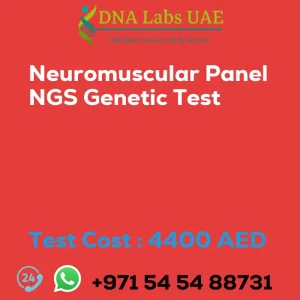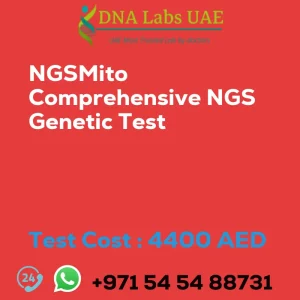SCN9A Gene Neuropathy hereditary sensory and autonomic type 2 Genetic Test
At DNA Labs UAE, we offer the SCN9A Gene Neuropathy hereditary sensory and autonomic type 2 Genetic Test. This test is designed to analyze the SCN9A gene, which encodes a sodium channel protein called Nav1.7. The Nav1.7 protein is primarily expressed in the peripheral nervous system.
Hereditary sensory and autonomic neuropathy type 2 (HSAN2) is a rare genetic disorder that can occur due to mutations in the SCN9A gene. HSAN2 is characterized by the progressive loss of sensory and autonomic nerve function. Symptoms of this condition typically appear in infancy or early childhood and may include insensitivity to pain, impaired temperature regulation, lack of sweating, and gastrointestinal abnormalities. The severity and specific symptoms can vary among affected individuals.
The SCN9A Gene Neuropathy hereditary sensory and autonomic type 2 Genetic Test utilizes next-generation sequencing (NGS) technology. NGS allows for the simultaneous analysis of multiple genes, including the SCN9A gene. This comprehensive analysis can identify various mutations and variations in the gene, providing valuable insights into the genetic basis of HSAN2.
If you suspect HSAN2 or have confirmed symptoms of the condition, our genetic test can help confirm a diagnosis. Additionally, our test can be used for carrier testing in individuals with a family history of HSAN2 or for prenatal testing in at-risk pregnancies.
It’s important to note that genetic testing should be performed by healthcare professionals specializing in genetics, such as genetic counselors or geneticists. These experts can guide you through the testing process, interpret the results, and provide information on the implications for you and your family.
Test Details
- Test Name: SCN9A Gene Neuropathy hereditary sensory and autonomic type 2 Genetic Test
- Components: NGS Technology
- Price: 4400.0 AED
- Sample Condition: Blood or Extracted DNA or One drop Blood on FTA Card
- Report Delivery: 3 to 4 Weeks
- Test Type: Neurological Disorders
- Doctor: Neurologist
- Test Department: Genetics
- Pre Test Information: Clinical History of Patient who is going for SCN9A Gene Neuropathy, hereditary sensory and autonomic type 2 NGS Genetic DNA Test. A Genetic Counselling session to draw a pedigree chart of family members affected with SCN9A Gene Neuropathy, hereditary sensory and autonomic type 2
| Test Name | SCN9A Gene Neuropathy hereditary sensory and autonomic type 2 Genetic Test |
|---|---|
| Components | |
| Price | 4400.0 AED |
| Sample Condition | Blood or Extracted DNA or One drop Blood on FTA Card o |
| Report Delivery | 3 to 4 Weeks |
| Method | NGS Technology |
| Test type | Neurological Disorders |
| Doctor | Neurologist |
| Test Department: | Genetics |
| Pre Test Information | Clinical History of Patient who is going for SCN9A Gene Neuropathy, hereditary sensory and autonomic type 2 NGS Genetic DNA Test A Genetic Counselling session to draw a pedigree chart of family members affected with SCN9A Gene Neuropathy, hereditary sensory and autonomic type 2 |
| Test Details |
The SCN9A gene is responsible for encoding a sodium channel protein called Nav1.7, which is primarily expressed in the peripheral nervous system. Mutations in the SCN9A gene can lead to a condition known as hereditary sensory and autonomic neuropathy type 2 (HSAN2). HSAN2 is a rare genetic disorder characterized by progressive loss of sensory and autonomic nerve function. Symptoms typically manifest in infancy or early childhood and may include insensitivity to pain, impaired temperature regulation, lack of sweating, and gastrointestinal abnormalities. The severity and specific symptoms can vary widely among affected individuals. Next-generation sequencing (NGS) is a genetic testing method that allows for the simultaneous analysis of multiple genes, including the SCN9A gene. NGS can identify various mutations and variations in the gene, providing a comprehensive analysis of the genetic basis of HSAN2. Genetic testing for SCN9A gene mutations can help confirm a diagnosis of HSAN2 in individuals with suspected or confirmed symptoms of the condition. It can also be used for carrier testing in individuals with a family history of HSAN2 or for prenatal testing in at-risk pregnancies. It is important to note that genetic testing is typically performed by healthcare professionals who specialize in genetics, such as genetic counselors or geneticists. They can provide detailed information about the testing process, interpretation of results, and implications for individuals and their families. |








